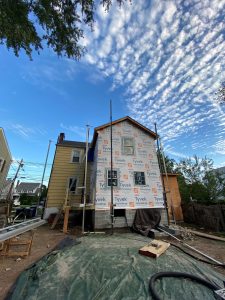New Jersey Construction Law Decision Explains How Consumer Fraud Act Balances Protections for Homeowners and Legitimate Contractors
The New Jersey Consumer Fraud Act and home improvement practices regulations presented a dilemma – they provide valuable tools protecting homeowners from unscrupulous home improvement contractors by awarding them triple damages and attorneys fees when successful, but risk imposing drastic penalties on legitimate contractors who miss some of their more technical requirements. However, as the Appellate Division recently explained in the case of Philip Dattolo v. EMC Squared LLC and Edward T. Morgan, the requirement that a homeowner must prove ascertainable damages which result from the consumer fraud violations goes a long way toward resolving this conflict.
ascertainable damages which result from the consumer fraud violations goes a long way toward resolving this conflict.
Background
The facts of the case are these. Dattolo contracted with EMC Squared LLC to construct a single-family home in Boonton, New Jersey in October 2018. EMC was solely owned by Edward Morgan. In March 2019, EMC offered a list of extras, and Dattolo accepted some. EMC created a written change order but it was never signed. In January 2020, Mogan told Dattolo that EMC was unable to continue. He told Dattolo that the project received final inspections. He gave Dattolo a final bill with credit for the unfinished work. Dattolo refused to pay, asserting many construction defects existed which would cause him considerable expense to correct.
Dattolo sued EMC, as well as Morgan personally, in the Law Division of the Superior Court of New Jersey for breach of contract, breach of the implied covenant of good faith and fair dealing, unjust enrichment, fraud and violation of the New Jersey Consumer Fraud Act because he did not comply with the Department of Community Affairs’ regulations governing home improvement practices. EMC filed a counterclaim for the unpaid balance. The judge held a two-day bench trial. He dismissed EMC’s counterclaim because it walked off the job. He also found that Dattolo had not proved that Morgan should be personally liable. However, he did find that EMC had breached its contract, for which Dattolo’s damages totaled $29,603.95. The judge found that EMC had violated the New Jersey Consumer Fraud Act because the change order was not in writing and signed by bother parties; however he found that no ascertainable damages could be linked to failing to have the change order signed, and therefore refused to triple Dattolo’s damages. He did order EMC to pay Dattolo’s fees and litigation costs pursuant to the language in the contract in the amount of $15,000, reduced from a request of over $27,000.
The Appellate Division Explains the Requirements for Proving Consumer Fraud in Home Improvement Projects
Dattolo appealed to the Appellate Division of the Superior Court, objecting to the failure to find ascertainable damages and reduction of the attorneys fees. For a variety of reasons, the Appellate Division upheld the trial judge’s rulings. However, what was notable was its examination of the Consumer Fraud Act and the home improvement practices regulations.
The Appellate Division explained in its opinion that for a homeowner to prove a violation of the New Jersey Consumer Fraud Act because of violation of home improvement practices regulations, the homeowner must prove that the home improvement contractor engaged in unlawful conduct prohibited by the Consumer Fraud Act and regulations, an ascertainable loss, and that the consumer fraud violation had a “causal relationship” with the ascertainable loss. To prove ascertainable loss, the homeowner must demonstrate “some loss” that is “capable of calculation.” This does not mean that the loss is going to be immediate, or actually realized (for example, loss of value would not be realized until a property is sold). For this reason, damages which can be estimated with a reasonable degree of certainty will satisfy ascertainable loss. They must be “definite, certain and measurable,” rather than merely “theoretical.”
The Takeaway
The impact of this is that the New Jersey Consumer Fraud Act and home improvement practices regulations give homeowners a valuable tool to enforce their rights against unscrupulous contractors. However, the requirement that homeowners prove ascertainable damages resulting from the consumer fraud protects legitimate contractors.
Questions About Consumer Fraud in Home Improvement Contracts
If you have any questions regarding New Jersey construction law, including consumer fraud in home improvement projects, please fill out the contact form on this page or call (973) 890-0004 to schedule a consultation with one of our New Jersey construction attorneys.
 New Jersey Lawyers Blog
New Jersey Lawyers Blog

